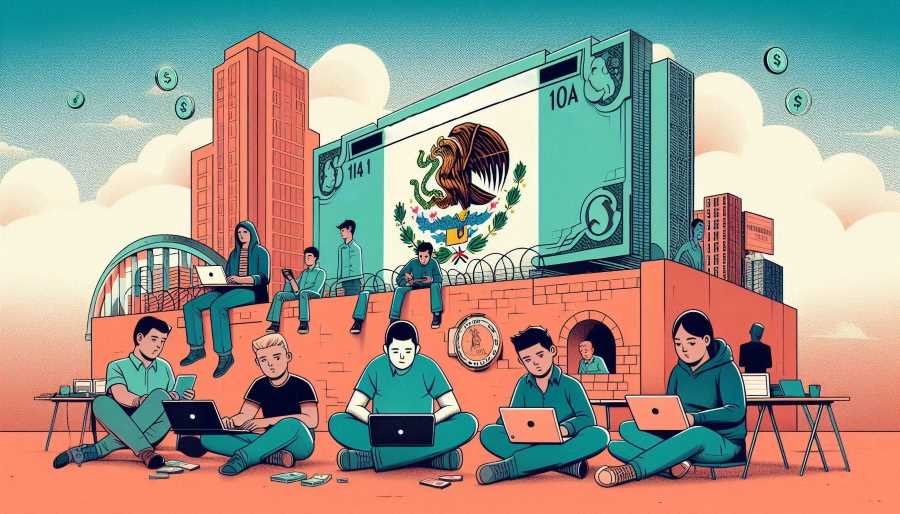Mexico's Youth to Get Paid for Pursuing Job Skills
The Constitutional Points Commission approved a measure to amend Article 123 of Mexico's Constitution, providing monthly economic support equivalent to one minimum wage to unemployed young people aged eighteen to twenty-nine for job training.

In an era where economic uncertainties loom large, legislative moves often seem like a dense thicket of bureaucratic verbiage. Yet, every so often, a proposal emerges that navigates this thicket and aims to reshape the landscape. Such is the case with the recent approval by Mexico's Constitutional Points Commission, an event that resonates with the idealism of youthful ambition and the pragmatism of economic policy.
On a seemingly ordinary Thursday, the Constitutional Points Commission, under the stewardship of Deputy Juan Ramiro Robledo Ruiz from the Morena party, cast a decisive vote. With 37 votes in favor, none opposed, and a solitary abstention, the commission endorsed the first of four amendments to Article 123 of the Political Constitution. This specific opinion, embedded in a document conceived from an initiative presented on February 5, 2024, by the Federal Executive alongside other deputies, marks a significant stride towards embedding monthly economic support for the nation's youth into the constitutional framework.
The essence of this legislative maneuver is both straightforward and profound: it mandates the state to provide monthly economic support equivalent to at least one current general minimum wage to young individuals aged eighteen to twenty-nine. The target beneficiaries are those who find themselves at the crossroads of unemployment and educational hiatus. The envisioned support aims to enable these young people to engage in vocational training across various economic entities, ranging from businesses and companies to workshops and stores, for up to 12 months, as delineated by the law.
The legislative text, often perceived as a labyrinthine affair, received a touch of poetic clarity through the intervention of Deputy Oscar Canton Zetina, also from Morena. His reservation, approved with 38 votes in favor, zero against, and one abstention, sought to articulate the age range in words rather than numerals—transforming "18 and 29" into "eighteen and twenty-nine". This seemingly minor alteration underscores a deeper commitment to precision and comprehensibility in legal language, ensuring that the order and interpretation of the statute remain unequivocal.
This constitutional amendment is not an isolated instance but part of a broader legislative mosaic, with three additional opinions slated for discussion. These encompass critical themes such as retirement pensions, salaries, and housing for workers—each thread weaving into the larger tapestry of social and economic rights.
To appreciate the gravity of this constitutional inclusion, one must delve into the socio-economic pulse of contemporary Mexico. The nation's youth, often hailed as the harbingers of future prosperity, grapple with a unique set of challenges. The transition from education to employment is frequently fraught with hurdles, ranging from a mismatch of skills to a paucity of opportunities. In this context, the provision of economic support coupled with vocational training emerges as a beacon of hope.
The rationale is multi-faceted. Firstly, it acknowledges the economic vulnerability of young people who are neither employed nor in formal education—a demographic that risks slipping through the cracks of conventional support systems. Secondly, it fosters a culture of continuous skill development, aligning the capabilities of young workers with the evolving demands of the job market. Thirdly, it injects a measure of financial stability into the lives of young individuals, enabling them to contribute productively to the economy.
While the approval by the Constitutional Points Commission marks a critical milestone, the progression from legislative text to tangible impact is complex. The implementation of this economic support system will require meticulous planning and robust infrastructure. Key questions loom: How will the state identify eligible beneficiaries? What mechanisms will ensure the effective delivery and utilization of the support? How will the program be monitored and evaluated to ensure it meets its objectives?
These questions necessitate collaborative efforts between various arms of the government, private sector stakeholders, and civil society organizations. The success of this initiative hinges on its ability to transcend bureaucratic inertia and translate legislative intent into meaningful action on the ground.
Amidst the gravitas of constitutional amendments and economic policies, there lies a curious anecdote—the transformation of numerals into words. Deputy Oscar Canton Zetina's proposal to write "eighteen and twenty-nine" instead of "18 and 29" may seem trivial to the uninitiated. Yet, this linguistic shift is emblematic of a deeper philosophy that pervades legislative drafting: the quest for clarity and precision.
Legal documents, often criticized for their opacity, are the bedrock of governance. The choice of words, the structure of sentences, and the presentation of information all play pivotal roles in shaping how laws are interpreted and implemented. In this light, the poetic flourish of spelling out ages in words is more than a stylistic preference; it is a sign to the meticulous care that underpins legislative craftsmanship.
A Chorus of Support and Critique
Chaired by Deputy Juan Ramiro Robledo Ruiz (Morena), the Commission’s decision was celebrated as a historical moment. Deputy Salvador Caro Cabrera (Morena) encapsulated the sentiment of the assembly, emphasizing the unprecedented horizon this social policy opens for young people aged eighteen to twenty-nine. “We are making history in this legislative process; it is a pride that this type of initiative arouses the majority and practically unanimous will of this Chamber. Let it be for of the youth of Mexico and those who need it most at this time,” he proclaimed.
The legislative floor buzzed with diverse perspectives, each deputy bringing their unique lens to the discussion. Deputy René Figueroa Reyes (PAN) proposed a more expansive vision for the program, advocating for universal support for all young people within the age bracket, regardless of their employment or educational status. He underscored the need to channel this support towards enhancing productivity and technological capabilities within economic units.
From the PRI, Deputy Laura Lorena Haro Ramírez voiced her endorsement of initiatives that foster youth engagement in political and community development. However, she critiqued the placement of the amendment within Article 123, arguing that it would be more fitting under Article 4, which addresses social programs. “No one could be against youth being encouraged and supported; however, it should be in article 4, which speaks of social programs, and not in article 123; I think it is absurd,” she stated.
Deputy Armando Antonio Gómez Betancourt (PVEM) highlighted the reform’s potential to institutionalize the Youth Building the Future Program, transforming it from a temporary initiative into a constitutional right. “The reform will generate positive impacts on the country's labor force and on the acquisition of skills for the employment force,” he noted, stressing the continuity and guarantees this change would provide.
Deputy Mary Carmen Bernal Martínez (PT) echoed the sentiment of elevating successful programs to constitutional status, asserting that the youth need more than just a social label—they require tangible tools to succeed. Her stance reflects a broader understanding that constitutional enshrinement would provide the necessary stability and resources for young people to thrive.
On a more specific note, Deputy Braulio López Ochoa (MC) called for targeted support for specific demographics within the youth population. He emphasized the need for assistance to young single mothers, increased university enrollment, and incentives for entrepreneurship, sports, and culture. “There is much to do to provide equal conditions for Mexican children, adolescents, and youth,” he argued, highlighting the multifaceted approach required to uplift the younger generation.
Conversely, Deputy Cynthia Iliana López Castro (PRI) raised concerns about the practicalities of the proposal. She pointed out the necessity of addressing public transportation support for young people to help reduce the high dropout rates plaguing the nation’s universities. “We need to support young people so they can finish their university studies; there is a tremendous dropout rate in the country, and it is not being discussed,” she cautioned, advocating for a more comprehensive support framework.
Amid the robust debate, the intervention of Deputy Oscar Canton Zetina (Morena) added a touch of linguistic elegance to the proceedings. His reservation, which was accepted, proposed that the age range be written in words rather than numbers—transforming "18 and 29" into "eighteen and twenty-nine". This subtle yet significant change aims to enhance the clarity and interpretation of the statute, reflecting a meticulous attention to legal precision.
The proposal saw broad support, though not without dissent. Reservations presented by Deputies René Figueroa Reyes (PAN) and Braulio López Ochoa Mijares (MC) were ultimately not accepted for discussion, highlighting the complexities and compromises inherent in the legislative process. Nevertheless, Deputy Manuel Vázquez Arellano (Morena) lent his support to Deputy Oscar Canton's reservation, demonstrating a unified front within Morena.
A Historic Decision
In a deft move of legislative strategy, Deputy Robledo Ruiz proposed—and the commission agreed—to postpone the discussion of seven opinions to the following Friday, August 9. These opinions span a broad spectrum of socio-economic issues, including modifications to Article 123 concerning support for youth, retirement pensions, salaries, and housing for workers. Also deferred were joint modifications to articles dealing with water, food, environmental protection, medical care, welfare, health protection, and animal care.
Deputy Robledo Ruiz elucidated the rationale behind this deferral, noting the necessity of a structured schedule to ensure thorough discussion and deliberation. "The other opinions have a calendar except for two, whose discussion date will be specified on August 15," he explained. This careful orchestration allows for a focused and systematic approach to each opinion, ensuring that no issue is glossed over in the legislative rush.
The session saw a lively exchange of viewpoints from various deputies, each bringing their unique perspective to the legislative symphony. Deputy Cynthia Iliana López Castro (PRI) voiced her concerns about the need for practical support measures, such as public transportation assistance for young people, to combat the high dropout rates in universities. "We need to support young people so they can finish their university studies; there is a tremendous dropout rate in the country, and it is not being discussed," she argued.
From the PAN, Deputies Paulina Rubio Fernández and Miguel Humberto Rodarte De Lara emphasized the broader implications of the proposed modifications, advocating for a more inclusive approach that addresses the needs of all young people, not just those currently unemployed or out of school. Their calls for universal support underscore the ongoing debate about the scope and reach of social programs.
Deputies Susana Prieto Terrazas (non-party), María Guadalupe Chavira de la Rosa (Morena), and Irma Juan Carlos (Morena) added their voices to the discussion, each highlighting different facets of the proposed amendments. Their contributions reflect the multifaceted nature of legislative work, where diverse perspectives must be harmonized to craft effective and inclusive policies.
The session also saw the approval of the Board of Directors' agreement on the work for the discussion and voting of the draft opinions related to constitutional modification initiatives presented on February 5, 2024, by the Federal Executive and other deputies. This agreement, approved by majority, outlines the procedural framework for processing reservations of the opinions within the commission, ensuring adherence to regulatory provisions.
As the session concluded, the commission looked forward to the forthcoming discussions on August 9 and the subsequent specification of discussion dates on August 15. These future sessions promise to tackle pivotal issues, including the initiative proposing the extinction of certain autonomous constitutional bodies and potential judicial reforms.
Deputy Robledo Ruiz hinted at the circulation of a draft opinion on judicial reform, adding another layer of anticipation to the legislative calendar. "That day a date will be set to discuss and vote, if applicable, the opinion on the initiative that proposes the extinction of some autonomous constitutional bodies, and that day a draft opinion on judicial reform may also be circulated; that has not been circulated, and the date would be at least five days after the project is circulated," he elaborated.
The Constitutional Affairs Committee approved a ruling to raise monthly financial support for young people to constitutional status. Deputies express their positions to promote youth.




